Key takeaways:
- Understanding SEO budgeting requires a focus on both on-page and off-page strategies, recognizing it as an ongoing investment.
- Effective allocation of budget should emphasize high-impact areas like content creation, technical SEO, and ongoing training.
- Utilizing analytical tools (e.g., Google Analytics, Ahrefs) is crucial for tracking performance and making informed budget adjustments.
- Collaboration and prioritization among team members enhance strategy effectiveness and budget management outcomes.
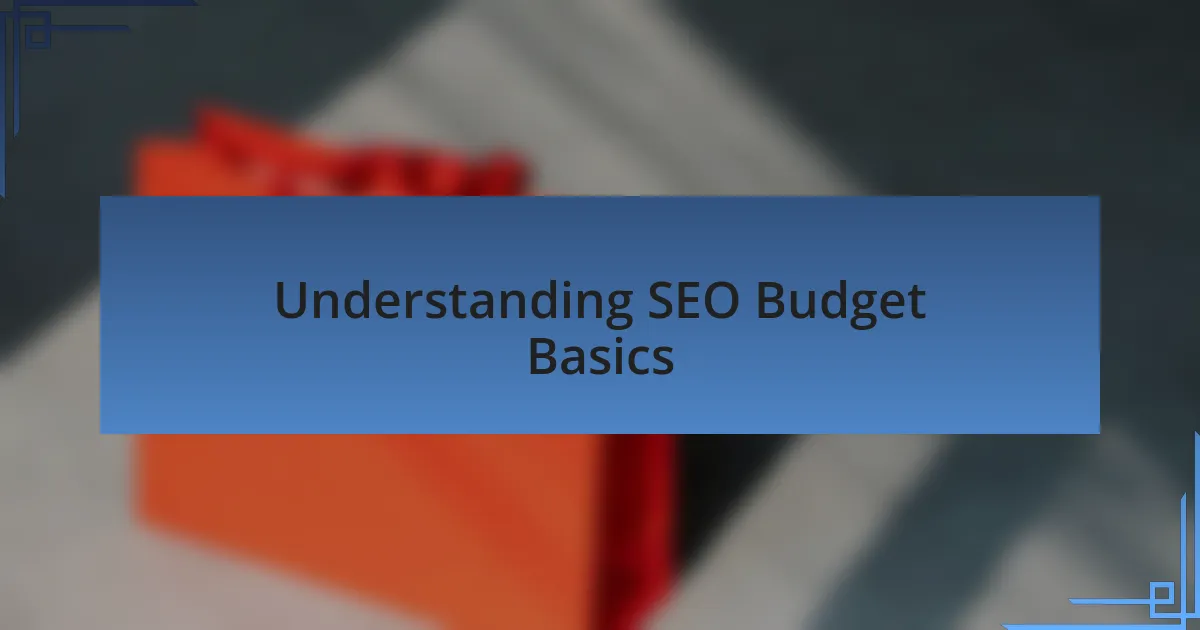
Understanding SEO Budget Basics
When I first dove into the world of SEO, I found myself overwhelmed by the varying costs associated with it. Questions swirled in my mind—how much should I really be spending? The truth is, understanding the basics of an SEO budget involves breaking down what you need for both on-page and off-page strategies, as well as recognizing that effective SEO is an ongoing investment, not just a one-time expense.
I’ve learned that prioritizing your goals can help make sense of your budget. For instance, I once allocated a chunk of my resources to technical SEO audits, which proved invaluable. It was like discovering a clogged artery in a seemingly healthy system; fixing those issues set the stage for better performance and ultimately justified the expense.
Another aspect to consider is the balance between quality and quantity in SEO services. In my experience, choosing between a high-volume approach and a more focused one can be tough. Have you ever wondered if it’s better to work with a larger agency for broader services or a specialist for tailored needs? Personally, I’ve leaned toward specialists for deeper insights and targeted strategies that really moved the needle for me.
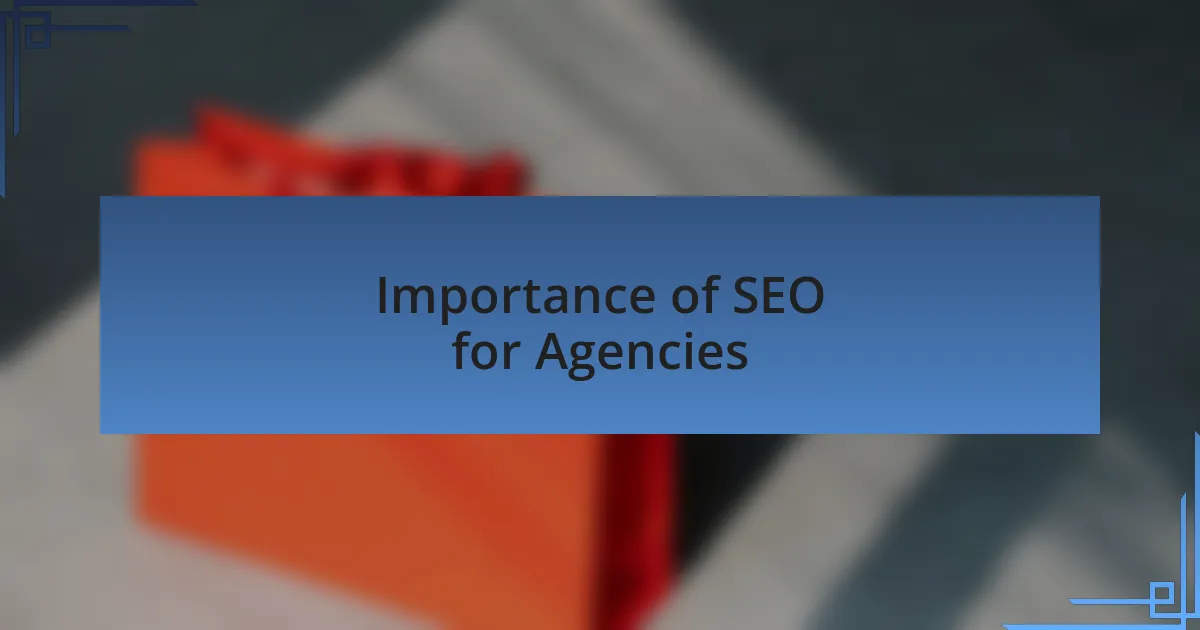
Importance of SEO for Agencies
The importance of SEO for agencies cannot be overstated. From my experience, it’s the backbone that supports a strong online presence, driving not just traffic but targeted traffic that converts. Have you ever noticed how a well-optimized site can attract the right customers while leaving competitors in the dust? When I first focused on SEO, I was amazed at how quickly the right keywords could elevate my agency’s visibility in search results.
Investing in SEO is like planting seeds for future growth. I remember my initial foray into keyword research—it felt tedious at first, but the payoff was undeniable. The moment I optimized my website for high-intent keywords, I saw a significant uptick in inquiries. It’s thrilling to realize that each strategic move makes my agency more competitive and helps connect with clients who genuinely need our services.
Furthermore, SEO fosters credibility and trust. In my journey, I’ve realized that a well-ranked website signals authority to potential clients. When I see my agency’s name appear on the first page of search results, it feels like a badge of honor. Have you ever considered how search rankings influence client perception? Investing in SEO is not just about numbers; it reflects a commitment to quality and professionalism that clients can sense from the outset.
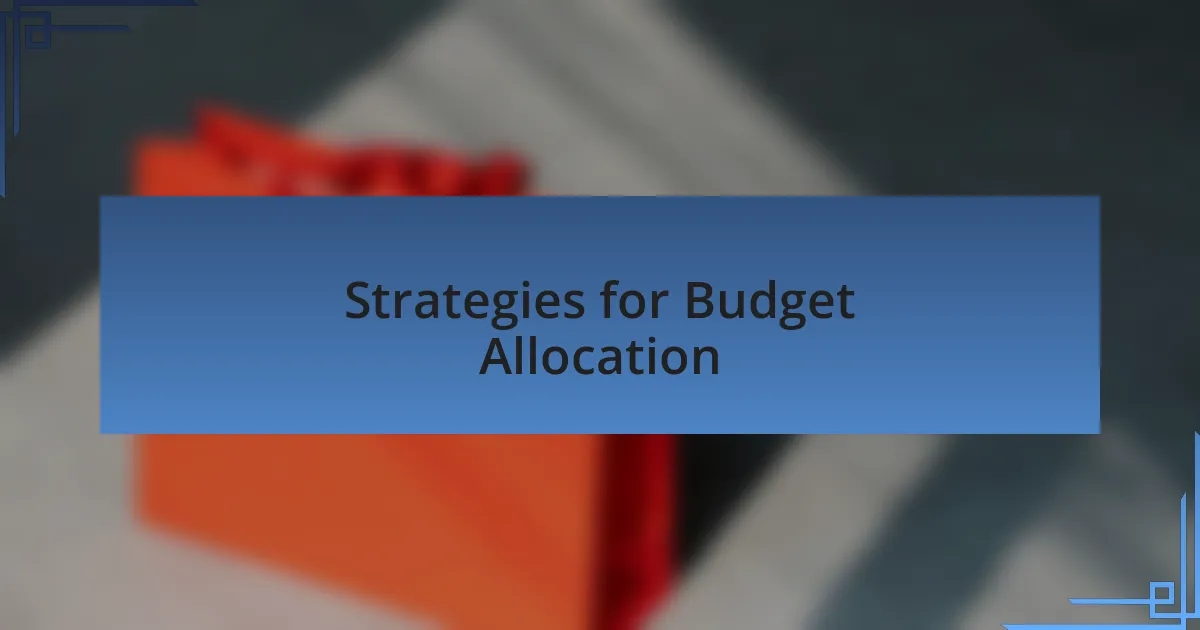
Strategies for Budget Allocation
To make the most of my SEO budget, I prioritize allocating funds based on potential ROI. In my experience, focusing on high-impact areas like content creation and technical SEO has yielded significant results. For instance, when I invested in detailed buy-in guides tailored to specific customer segments, I saw engagement levels soar, directly enhancing lead generation.
I’ve learned that a portion of the budget should be dedicated to ongoing training and tools. By equipping my team with the latest SEO tools and knowledge, we can adapt quickly to changes in algorithms and industry trends. Have you ever noticed how staying updated can give your agency a competitive edge? It’s exhilarating to think that investing in training has allowed me to optimize strategies that keep our clients ahead of the curve.
Finally, testing and analytics are crucial for informed budget allocation. I allocate funds for A/B testing various campaigns to understand what resonates more with our audience. I vividly recall a time when a subtle tweak in our call-to-action led to a 30% increase in conversions. Isn’t it fascinating how minor adjustments can make such a significant impact on results? This iterative approach has helped me make smarter budget decisions, ensuring every dollar spent drives value.
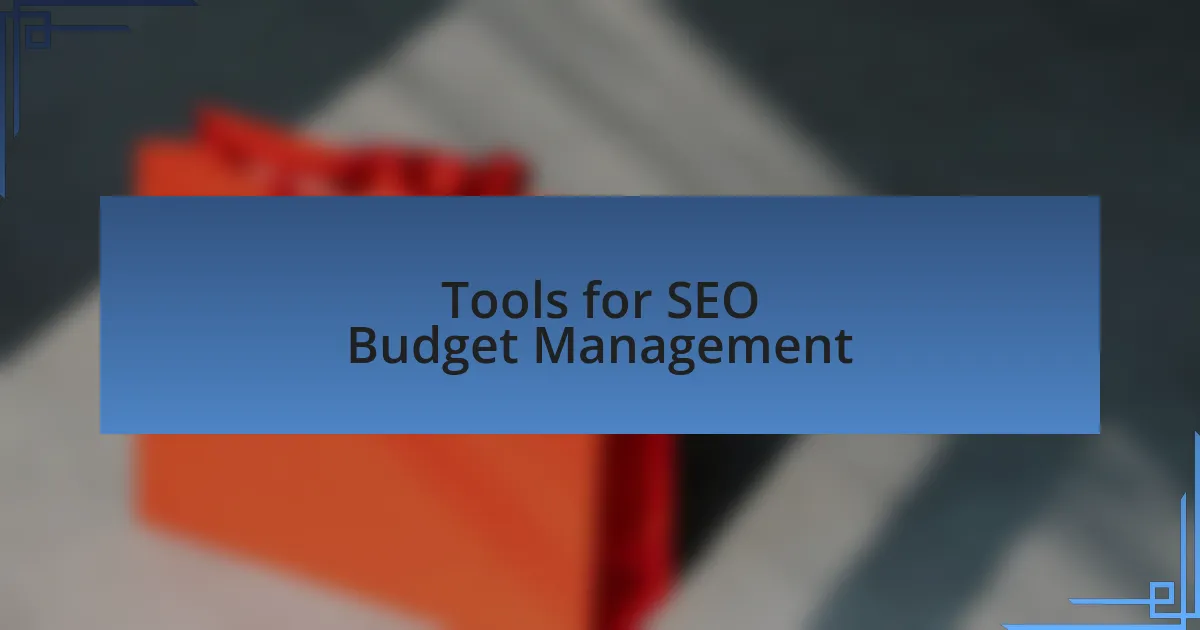
Tools for SEO Budget Management
When it comes to managing my SEO budget, I’ve relied heavily on tools like Google Analytics and Ahrefs. These platforms not only track website performance but also help me identify which keywords and pages are driving traffic. I still remember the first time I used Ahrefs to uncover a hidden opportunity in a low-competition niche—it felt like striking gold! Have you ever had a moment where a tool revealed insights that just clicked into place?
Another invaluable tool has been SEMrush, especially for competitor analysis. By examining what’s working for others in my industry, I can reallocate my resources towards strategies that have proven effective. I distinctly recall a project where we adapted a competitor’s successful blog strategy and modified it to reflect our voice; that shift led us to outperform them in search rankings. It’s amazing how leveraging these insights can turn uncertainty into confidence.
Lastly, budget management tools like HubSpot’s project management feature have streamlined our processes. Using their dashboard, I can visualize where our budget is going and make adjustments in real-time. There’s something incredibly satisfying about seeing those budget shifts lead to tangible results. Don’t you think having a clear view of your budget can transform how you operate?
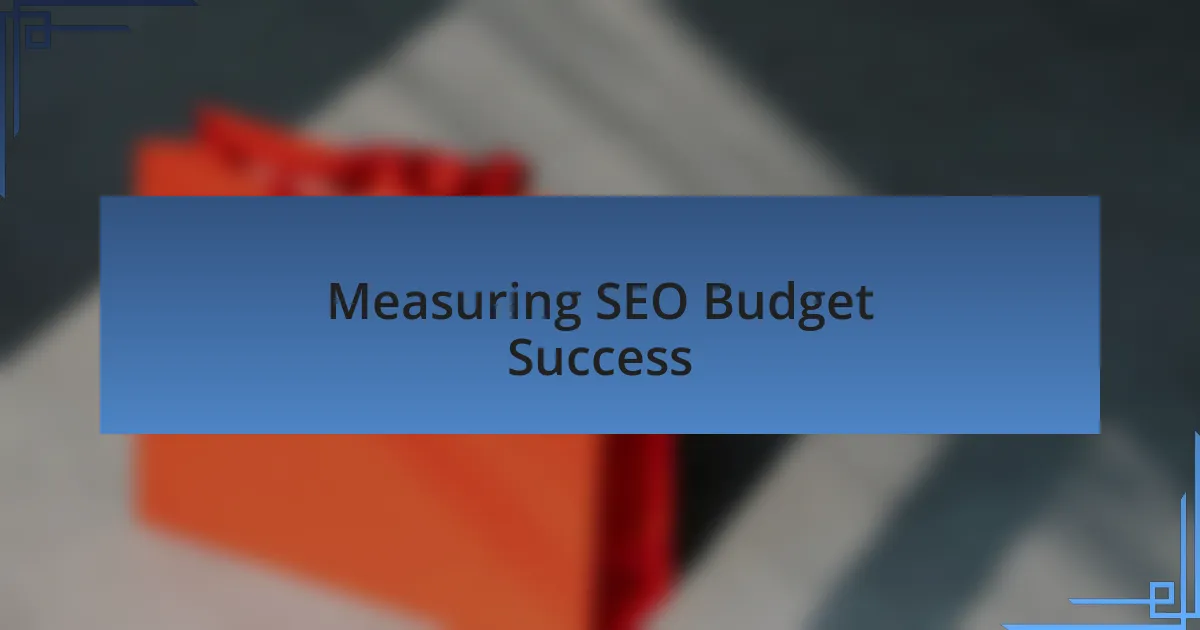
Measuring SEO Budget Success
When assessing the success of my SEO budget, I focus on specific key performance indicators (KPIs) such as organic traffic, conversion rates, and return on investment (ROI). I recall a time when I realized our organic traffic surged by 40% after investing more in targeted keywords. That was a huge wake-up call; seeing direct correlations between budget allocation and tangible results can be invigorating. Are you tracking your KPIs closely enough to notice such patterns?
I also believe in the power of A/B testing for measuring the effectiveness of my SEO strategies. Implementing A/B tests on landing pages allowed me to pinpoint what truly resonated with our audience. One experiment taught me that a simple tweak in the headline could lead to a 25% increase in sign-ups. Isn’t it rewarding to discover the nuances that can make such a big difference?
Having regular check-ins with my team to discuss the outcomes related to our budget helps ensure that we stay aligned with our goals. During one particularly reflective meeting, we examined our expenditures against traffic conversions and found that reallocating funds from underperforming campaigns sparked a new wave of growth. It’s moments like these that highlight the importance of being adaptable and open to change. How often do you reflect on your spending versus your actual outcomes?

My Personal SEO Budget Journey
My journey with SEO budgeting has been quite a rollercoaster ride. I remember the early days when I allocated funds without a clear strategy, hoping for the best. It was frustrating to watch my budget drain without seeing significant returns. Have you ever felt that pang of disappointment after a hefty expenditure? That realization hit me hard and made me reevaluate my entire approach to budgeting.
As I became more intentional with my budget, I shifted my focus towards understanding my target audience better. I recall investing in tools that provided deep insights into user behavior. Those investments paid off tremendously, transforming not just our ROI but also my confidence in decision-making. Isn’t it fascinating how the right information can turn uncertainty into strategic clarity?
Reflecting on my experiences, I’ve learned the importance of staying flexible. One memorable moment was when we temporarily paused a high-cost campaign that wasn’t delivering. By redirecting those funds into a new content strategy, I was amazed to see engagement soar. How often do we cling to plans that stop working for us? Embracing change has been a game-changer in maximizing my SEO budget.
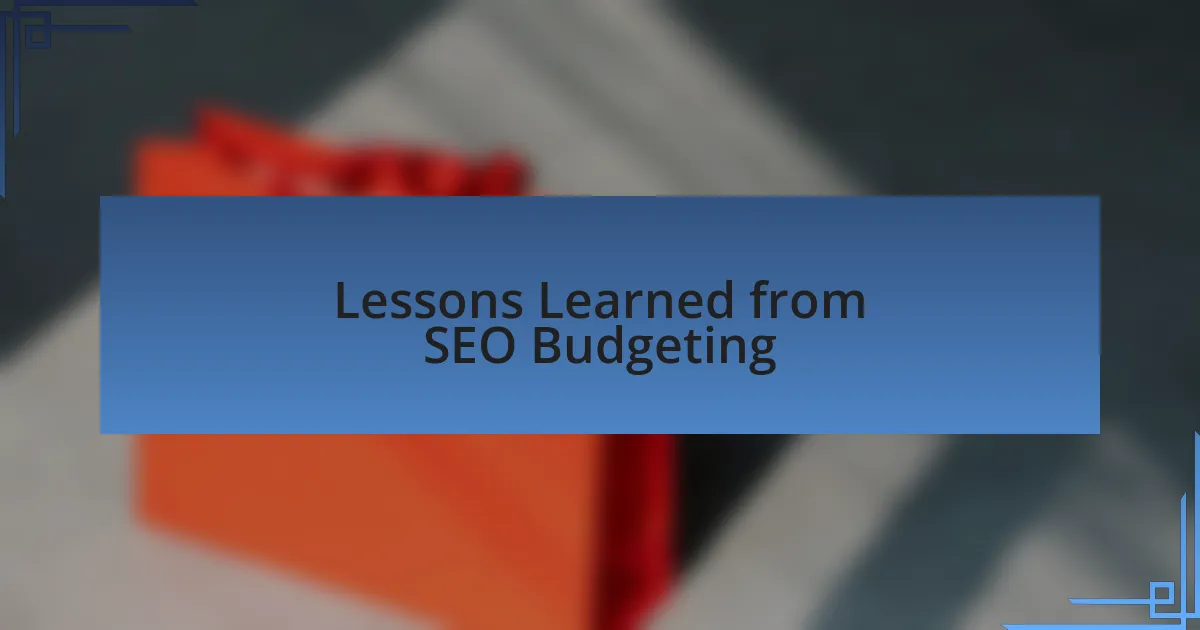
Lessons Learned from SEO Budgeting
One key lesson I learned is the significance of detailed tracking and analysis. When I first started, I would broadly assess performance metrics. It wasn’t until I began delving into specifics, like conversion rates and organic traffic growth, that I truly understood where my budget was best utilized. Have you ever overlooked a small detail that turned out to be instrumental? I found that even minor adjustments can lead to significant outcomes.
I also realized that collaboration is vital. Early on, I made the mistake of working in a silo. It was only when I engaged with my team, pooling insights from different perspectives, that we began crafting more effective strategies. It’s amazing how fresh ideas can emerge when everyone is on the same page; have you included your team in your budgeting discussions? Sharing responsibilities around budget decisions not only fosters innovation but also creates collective ownership of results.
Finally, I discovered the art of prioritization. There was a period when I tried to tackle multiple initiatives simultaneously, thinking it was the fastest route to success. Instead of seeing progress, I felt overwhelmed and scattered. Now, I focus on fewer, high-impact projects, allowing me to allocate resources more effectively. Reflecting on my journey, I can’t help but wonder: How often do we try to do too much instead of doing what matters most well? Focusing on priorities keeps my efforts concentrated and purposeful.